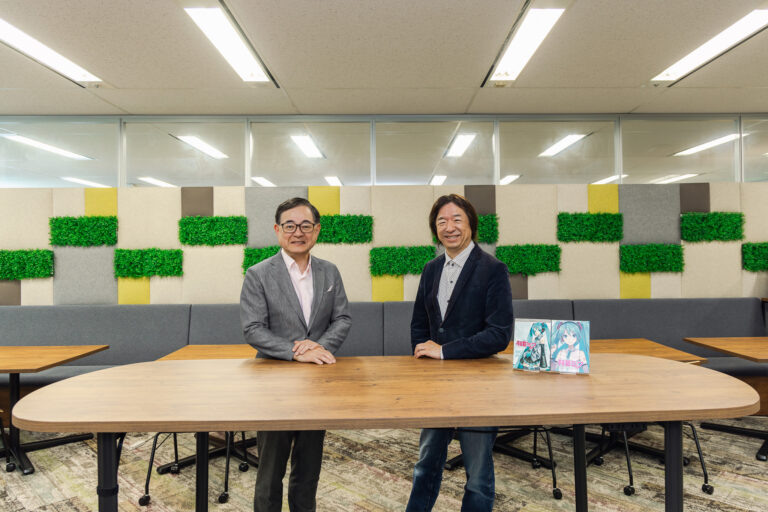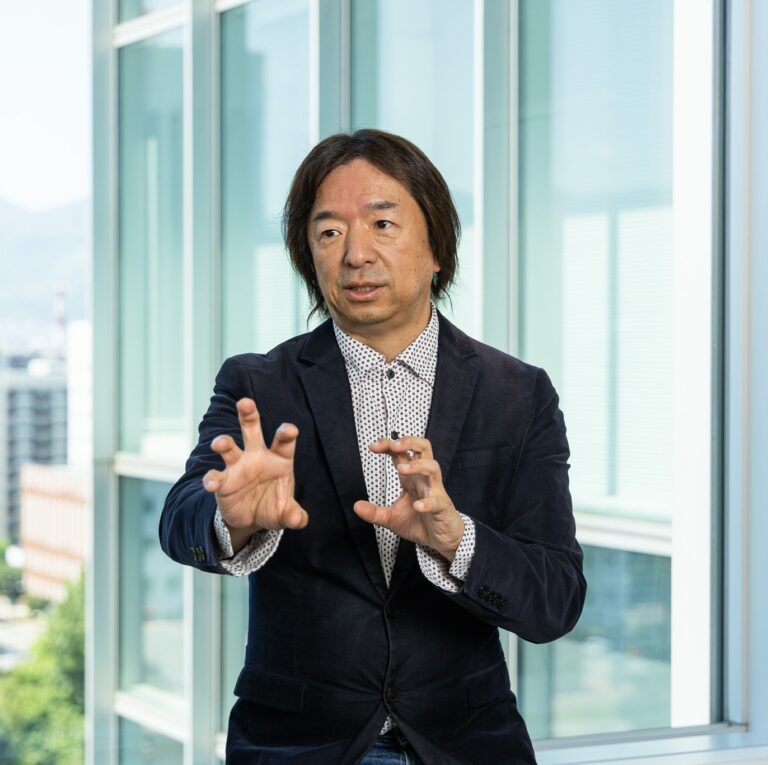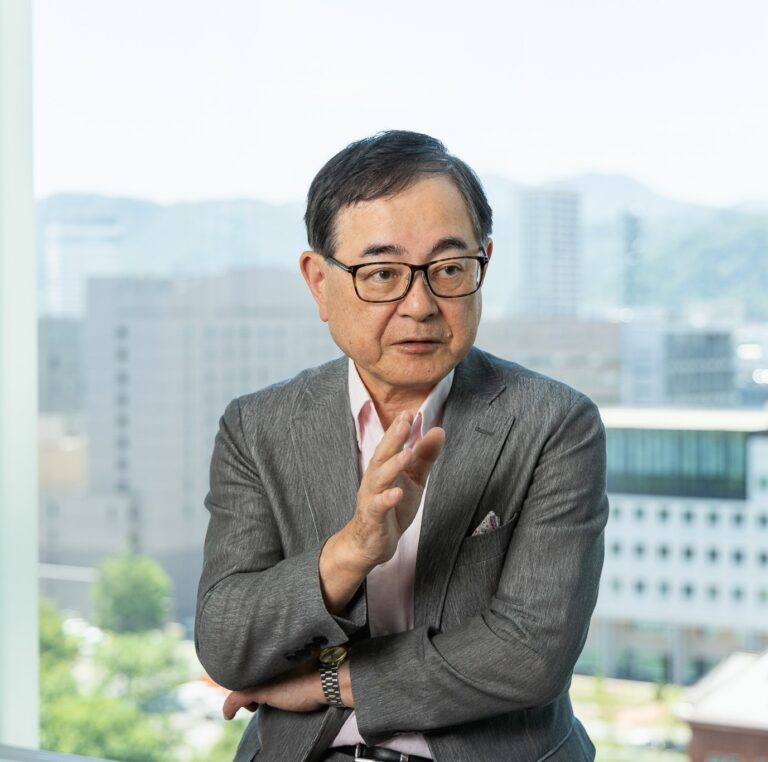This article was first published in Japanese in Litterae Populi magazine (Autumn 2025, Vol. 75).

Hatsune Miku, the "virtual singer" who now has fans worldwide, began as a music production software developed by a company in Sapporo. Hiroyuki Itoh, who is known for creating her, published his book "The Future of Creativity: Why Hatsune Miku Was Born in Hokkaido" this July. With this year marking the 30th anniversary of his company's founding, he continues to be active as a top runner in the digital music industry. President Kiyohiro Houkin, who is driving reforms to make Hokkaido University an unparalleled institution, interviewed Mr. Itoh, whose work experience at Hokkaido University became a turning point in his life.He inquired about his encounters with computers, his journey to starting his own business, and his thoughts on regional areas and creators.
Hiroyuki Itoh (Guest)
Representative Director, CRYPTON FUTURE MEDIA, INC.
Born in 1965 in Hokkaido. After graduating from high school, graduated from Hokkai-Gakuen University while working as an administrative staff member at Hokkaido University. Founded Crypton Future Media, INC. in 1995 and developed businesses specializing in sound, including sound effects, background music, and mobile phone ringtones. The vocal synthesizer Hatsune Miku was released in 2007, which became a huge hit. Has served as visiting professor at the Faculty of Information Media, Hokkaido Information University since 2008, and as professor at The Kyoto College of Graduate Studies for Informatics since 2013.
Kiyohiro Houkin (Interviewer)
President, Hokkaido University
Born in Hokkaido in 1954. Graduated from Hokkaido University School of Medicine. Doctor (medicine) (Hokkaido University). Worked for Hokkaido University Hospital and other facilities since 1979. After working as a visiting researcher at the University of California, Davis, became an assistant professor at the Hokkaido University Graduate School of Medicine in 2000, professor of Sapporo Medical University School of Medicine in 2001 and professor of the Hokkaido University Graduate School of Medicine in 2010. After becoming the director of Hokkaido University Hospital and vice executive president of Hokkaido University in 2013, and the director of Hokkaido University Hospital and vice president of Hokkaido University in 2017, assumed the present position in October 2020.
Encountering computers at Hokkaido University
Houkin: You're originally from Shibecha Town in Hokkaido, aren't you? What was your childhood like?
Itoh: I was just an ordinary kid. Nothing particularly good or bad about me.
Houkin: Were you in any clubs?
Itoh: My high school commute took an hour and a half by train, so I didn't join any clubs - I was in what we called the "go-home club." I loved music and would practice guitar by myself.
Houkin: I've met you a couple of times, and I have the impression that you're a very reserved person. I imagine some people might expect a different personality from someone who's succeeded in this industry. How do you see yourself?
Itoh: I don't want to stand out. When people say things like "You're amazing," I feel embarrassed. I'm the type of person who prefers to do everything quietly and methodically, processing it all within myself.
Houkin: After graduating from high school, you chose public service and joined the staff of Hokkaido University, didn't you?
Itoh: In my rural hometown, few people went on to university in the first place, so getting a job after graduating high school was the natural thing to do. There was an administrative position available in a lab at Hokkaido University's School of Engineering, and they hired me.
Houkin: Given your current profession, I think people might imagine you having followed a more avant-garde lifestyle, like backpacking around the world. Entering public service was a solid choice, wasn't it?
Itoh: If I had become an ordinary public servant, I think I would have ended up with an utterly mundane life. But the lab I was assigned to was a bit unusual. The staff were told to participate in seminars and research, and my predecessors and successors both earned degrees while working there.

Houkin: That's remarkable. It's not an environment you see much nowadays. That's where you encountered computers, isn't it?
Itoh: Yes. Since the lab I joined was in the Department of Precision Engineering and mainly did machine design, there were computers all around me. Having never touched one before, I felt I wouldn't be able to do my job without knowing how to use one. So, I studied and obtained a qualification in information processing. This qualification gave me the opportunity to learn programming, and I studied English, which I was weak in, in order to read academic papers in that language.
Houkin: That's quite an exceptional story, isn't it? I think you had your own potential, and when that combined with the environment, a chemical reaction occurred. But this kind of thing just doesn't really happen in today's university environment.
Itoh: The professor at the time, who was from Kyoto, encouraged me, saying, "You should go to university too." I realized that university was also an option for me and started attending evening classes at Hokkai-Gakuen University. During the day I worked at Hokkaido University, and at 5 p.m. I'd bike over to Hokkai-Gakuen University. My life became going back and forth between the two universities.
Houkin: Does what you learned at that time still help you in your current work?
Itoh: What I realized from going back and forth between the two universities was that university isn't just a place for studying. It's also a place to broaden your knowledge and create many 'drawers' of knowledge. It was also a place for me to master how to learn and I realized how incredibly important that experience is. I don't think I'd have been able to experience that if I'd just remained an ordinary public servant, so it was extremely valuable.
Houkin: The business models you learned at university must have been important knowledge for your later entrepreneurship as well.
Itoh: The high school I graduated from wasn't a commercial high school, but for some reason it had bookkeeping classes. Since I'd obtained a Level 3 bookkeeping qualification, I had a practical foundation in business management. That was extremely helpful when I took management-related classes at university.
Selling self-created sounds oversea
Houkin: Your workplace was the School of Engineering, which provided a conducive environment for staff to learn. You had some exposure to business in high school and then studied it at Hokkai-Gakuen University. I think it was a miraculous combination of sorts. What led you to start your own business?
Itoh: During the 10 years from 1985 when I was on staff at Hokkaido University, I learned about the existence of the internet relatively early on. At the time, I was playing guitar as a hobby and collaborating with overseas creators for fun. I'd put songs I'd created on floppy disks and send them by airmail to my collaborators, but it would take months for them to add their parts and send them back. By then, I couldn't remember the initial creative passion anymore and couldn't continue. But with the internet, you could send things instantly. I was shocked, thinking this infrastructure was going to change the world. I realized this was no time for me to be working as a public servant.
Houkin: I also encountered the internet at the University of California in 1986. You could write a paper in Word, send it, and it would arrive. It's taken for granted now, but it was indeed shocking. Still, quitting your job must have been a big decision. Did you have anything lined up?

Itoh: It was more like I quit after I'd started, rather than starting after I'd quit. My library of self-created sounds had grown to a considerable amount, so I placed an ad in an American music magazine to sell them. That was the beginning. Back then, computers were just emerging. I'd connect electronic equipment to build my own system and record everyday sounds with a microphone. I put the sounds I created onto floppy disks and mailed them out.
Houkin: That was an English-language magazine, right? An American magazine specializing in computer music was quite rare in itself, wasn't it?
Itoh: This was the late 1980s, before there was any internet. I was exporting sounds by placing $50 three-line personal ads. Before long, I started receiving counteroffers from overseas saying, "We're creating sounds. Would you sell them in Japan?" When the yen strengthened in the early 1990s, I came up with the idea that I, being in Japan, could import sounds from overseas and sell them by advertising in Japanese magazines. So, I switched to import sales. That was the origin of my current company.
Hatsune Miku is a musical instrument
Houkin: Could you tell us the story of how Hatsune Miku came to be created during your work specializing in sound?
Itoh: We've been selling "software for creating one's own music" since the company's founding in 1995. While Hatsune Miku is seen as a character, she's actually a "software that makes computers sing." At the time, we were selling all kinds of software-drum software, guitar software, and software for other instruments-but there was one thing we were yet to sell: "software that sings." When we heard that Yamaha Corporation had developed that technology, we used it as the foundation to launch our first-generation software called MEIKO in 2004. Hatsune Miku was the third Vocaloid we developed in 2007.
Houkin: Why was it Hatsune Miku that became such a phenomenon?
Itoh: There are several factors, but the major one was the emergence of YouTube and Niconico [a Japanese video sharing service]. These video-sharing sites enabled creators to publish their works, and that's when Hatsune Miku became all the rage. Another factor was that we used the voice of a voice actress who was active in anime and other media for the first time. We also had a creator design character illustrations specifically for the product launch.
Houkin: You allow derivative works using Hatsune Miku to be created freely, don't you?
Itoh: Hatsune Miku is a software for creating music, so you could say she's an instrument. When you create and release a song using a piano, you don't need to get permission from the piano manufacturer, right? By having people use her on the internet, her popularity spreads, so we chose to leave it to the creators.
Houkin: Hatsune Miku is also active in local collaborations. How do you view your relationship with local communities, including the fact that you're headquartered in Sapporo?
Itoh: When the internet emerged, I had high hopes for its potential, thinking it might eliminate the disadvantages of being in local areas in the music business and publishing alike. That's why we decided to set up our headquarters in Sapporo. When it comes to creativity, I want to support people who continue their activities in local areas, and use the internet to make Sapporo vibrant. With those feelings in mind, we create a snow sculpture of SNOW MIKU (Hatsune Miku) at the Snow Festival and hold the SNOW MIKU Festival for the creators.
Houkin: This is something I really wanted to ask you about-how do you see the future of generative AI?
Itoh: I think AI is an inevitable part of our civilization's evolution and I'm fascinated to see how it will develop. There was a time when electricity was a luxury and now the internet is a fundamental part of our infrastructure. In the same way, I believe civilization will advance with the existence of AI as a given. Long ago, people's ideas were captured in cave paintings, and later paper and pens became widespread. I think AI will be used like a new kind of "pen."
Houkin: These days, I feel like everyone is looking for things that AI cannot do.
Itoh: I think the ideal would be a world where people coexist harmoniously with AI rather than finding what AI cannot do. Japan has been depicting such a world through fiction such as Astro Boy from an early stage.
Houkin: Japan might be able to take the lead in realizing a society that coexists harmoniously with AI. I'll definitely read your book that was published in July. Thank you for your time today.






